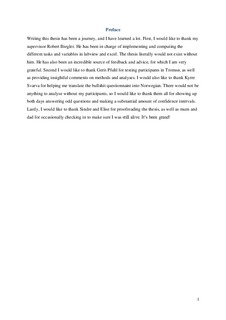| dc.description.abstract | Miscalibration of prediction errors has been suggested as a parameter gone awry in both psychosis and autism spectrum disorders. The aim of this study was to investigate this claim by having participants participate in a task measuring precision of long-term and shortterm memory over two days. On day one they had to go through discrimination training, where they learned to recognize one specific shape, as well as completing questionnaires measuring traits associated with psychosis (CAPE-42) and autism (short AQ and SQ) as well as the bullshit receptivity questionnaire. Day two they had to complete 1 long-term precision task, as well as two short-term memory precision tasks. Participants were recruited from Trondheim and Tromsø and were mainly students (N=53 after exclusion). I found no apparent relationship between miscalibration of precision in short-term memory and long-term memory on psychosis. Score on the short SQ showed a weak negative relationship with long-term and short-term precision miscalibration. Interesting correlations were found between ability to detect bullshit, and tendencies towards psychosis and autism (AQ). These relationships could prove interesting to investigate further in later studies with a larger sample, including people with diagnosed autism and psychosis. | nb_NO |
